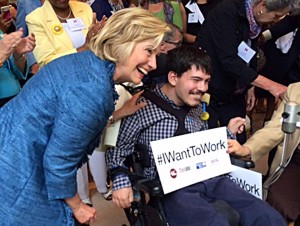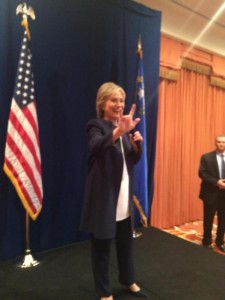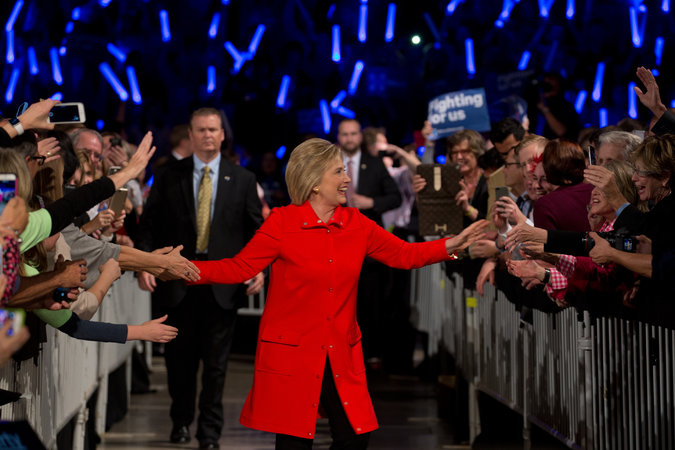
Concord, N.H., Feb. 6 – When Hillary Clinton declared her candidacy for president on April 12, 2015, her campaign did not make a point of taking people with disabilities into account. She came under scrutiny for not including people with disabilities in her announcement video, and her famed van momentarily stopping in a handicap parking spot in Council Bluffs, Iowa in April drew negative attention.
In the following seven months, Clinton’s campaign became much more disability friendly. While she was one of the first presidential candidates to talk about disability issues, often it was done very clumsily and insensitively toward people with disabilities.
For example, on more than one occasion, Clinton referred to Autism as a “disease,” which many people in the Autism community consider to be a huge personal insult. Autism is not a disease that physically harms an individual like Cancer and Alzheimer’s disease does. In addition, whenever she would be asked any question relating to disability issues, her go-to answer was to talk about her work with the Children’s Defense Fund in the 1970s, well before the Americans with Disabilities Act (ADA) was passed.
In August, former Sen. Tom Harkin endorsed Clinton. Former Rep. Tony Coelho also through his support behind the former Secretary of State. Both Harkin and Coelho were key to the passage of the ADA and have been advising Clinton on disability policy.
Following conversations with Harkin, Coelho and a variety of other disability leaders, Clinton’s campaign slowly began to improve how they address disability issues such as employment and care. In September, the campaign added a page to her website dedicated to disability issues, becoming the first campaign to do so. In addition, the campaign began putting typed-in captions on the majority of their campaign videos. This is a huge deal because often times automatic captions like those done by YouTube are full of errors, not allowing people who are deaf or hard of hearing access to the full message.

As the primary heated up, the Clinton campaign, along with the Sanders campaign, became one of the few campaigns to regularly include an ASL interpreter for her larger rallies and town halls.
Clinton first brought up Autism on the trail at the annual Jefferson-Jackson Dinner at Hy-Vee Hall in Des Moines in October.
“While we fight for a growth and fairness economy that works for everyone, we can’t forget the quieter problems that don’t often make the headlines,” she said.
“I’m also fighting for the grandmother who told me she is raising her grandchild because of her daughter’s struggle with drug addiction. For the mom who asked me what she’s going to do when her child with autism gets older. For every family trying to cope with untreated mental illness. I’m fighting for the man I met whose mother has Alzheimer’s. He cannot afford a full-time caretaker. So you know what he does? He’s a teacher. He takes his mother to work with him.”
Several months later, Clinton announced plans for both Alzheimer’s and Autism. Recently, she completed the #PwDsVote 2016 Presidential Campaign Questionnaire, along with Jeb Bush, Ben Carson, Chris Christie, John Kasich and Bernie Sanders.
Most recently, Clinton has adjusted her stump speech in order to include people with disabilities on a regular basis. At both the MSNBC Democratic debate Thursday evening and the McIntyre-Shaheen 100 Club Dinner Friday night, she included people with disabilities as one of the groups for which she is fighting.
“We need to break down barriers of racism, sexism, discrimination against LGBT Americans, immigrants, and people with disabilities,” Clinton said.
This is a change in Clinton’s stump speech that’s worth noting.

Students have good grades to graduated. But why do we have iep diploma. We worked hard to follow our dreams. We are smart and normal just like everybody else. Can we be equal like everyone else to have a future?
[…] in a list of other typically disadvantaged minorities – much like presumptive Democratic nominee Hillary Clinton has been doing more recently in her speeches and […]
[…] was no accident. Disability rights activists had long been working with the Clinton campaign to get their issues into her standard stump speech. The disability community kept up the pressure […]
I have dealt with disabilities all my life. From having a brother with cerebal palsy in a wheelchair. To my career as hamecare provider. To raising my 16 year grandson who is develomentaly disabled and ADHD……This is good for all….